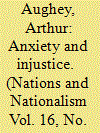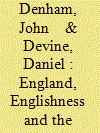|
|
|
Sort Order |
|
|
|
Items / Page
|
|
|
|
|
|
|
| Srl | Item |
| 1 |
ID:
098151


|
|
|
|
|
| Publication |
2010.
|
| Summary/Abstract |
An explicit and politically mobilised English nationalism has been remarkable because of its absence from deliberation on constitutional change in the United Kingdom. In short, it remains a mood and not a movement. This article explores the mood and explains why that mood has not become, as yet, a movement. It examines three related aspects of the English nationalist mood. First, it considers anxieties about the condition of contemporary England which can be found in the work of intellectuals and artists. Second, it identifies the sense of injustice which animates the lobby group the Campaign for an English Parliament. Finally, it looks at how mainstream party politics responds to these national anxieties and that sense of national injustice.
|
|
|
|
|
|
|
|
|
|
|
|
|
|
|
|
| 2 |
ID:
145556


|
|
|
|
|
| Summary/Abstract |
In the 1975 referendum England provided the strongest support for European integration, with a much smaller margin for membership in Scotland and Northern Ireland. By 2015 the rank order of ‘national’ attitudes to European integration had reversed. Now, England is the UK's most eurosceptic nation and may vote ‘Leave’, while Scotland seems set to generate a clear margin for ‘Remain’. The UK as a whole is a Brexit marginal. To understand the campaign, we need to make sense of the dynamics of public attitudes in each nation. We take an ‘archaeological’ approach to a limited evidence-base, to trace the development of attitudes to Europe in England since 1975. We find evidence of a link between English nationalism and euroscepticism. Whatever the result in 2016, contrasting outcomes in England and Scotland will exacerbate tensions in the UK's territorial constitution and could lead to the break-up of Britain.
|
|
|
|
|
|
|
|
|
|
|
|
|
|
|
|
| 3 |
ID:
162591


|
|
|
|
|
| Summary/Abstract |
Recent research has indicated that English identity was a strong predictor for a Leave vote in the referendum on membership of the European Union, and that it is an identity that is increasingly playing a role in British politics. In this paper, we explore whether Englishness affects even left‐right positioning of parties. Focusing on Labour, we find that it does, even controlling for other attitudinal and demographic variables. Alongside age and perceptions of the party leader, perceptions of immigration change and perceived lack of political efficacy also play a significant role. Given the potential electoral significance of this, we reflect on and propose a range of policy options that Labour could utilise to address this gap between English‐identifiers and the party.
|
|
|
|
|
|
|
|
|
|
|
|
|
|
|
|
| 4 |
ID:
091108


|
|
|
|
|
| Publication |
2009.
|
| Summary/Abstract |
This article analyses the importance of arguments developed since 1997 by influential right-wing commentators concerning Englishness and the United Kingdom. Drawing on historical, cultural and political themes, public intellectuals and commentators of the right have variously addressed the constitutional structure of the UK, the politics of devolved government in Wales and Scotland, and the emergence of a more salient contemporary English sensibility. This article offers case studies of the arguments of Simon Heffer, Peter Hitchens and Roger Scruton, all of whom have made controversial high-profile interventions on questions of national identity, culture and history. Drawing on original interviews with these as well as other key figures, the article addresses three central questions. First, what are the detailed arguments offered by Heffer, Hitchens and Scruton in relation to Englishness and the UK? Second, what does detailed consideration of these arguments reveal about the evolution of the politics of contemporary conservatism in relation to the Union? And, third, what kinds of opportunity currently exist for intellectuals and commentators on the fringes of mainstream politics to influence the terms of debate on these issues?
|
|
|
|
|
|
|
|
|
|
|
|
|
|
|
|
| 5 |
ID:
098149


|
|
|
|
|
| Publication |
2010.
|
| Summary/Abstract |
The current interest in Englishness and English national identity, spurred partly by parliamentary devolution to Scotland, Wales and Northern Ireland, has been accompanied by calls for an English parliament and even the promotion of a robust English nationalism. This article argues that this is a mistaken direction for the English. English traditions have been non-national and even supra-national. English identities have been especially bound up with Britain and Britishness. An England without Britain is hard to conceive, and would be impolitic to pursue. Survey evidence shows continuing Britishness among the English, with scant support for an English parliament or English independence. The expressions of English nationalism remain relatively muted. 'England for the English' is neither a realistic nor a sensible strategy.
|
|
|
|
|
|
|
|
|
|
|
|
|
|
|
|
|
|
|
|
|